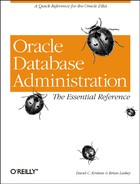Processes
Simply put, a process is a “thread of control,” or a mechanism within an operating system that can execute a series of steps. In other words, a process is a program running on a computer, under the control of that computer’s operating system. In most cases, the process (also called a job or a task) runs in its own memory space.
Oracle creates and uses two types of processes: Oracle processes and user processes. Oracle processes are created by Oracle to perform functions on its behalf. They can be further divided into two general categories: background processes and server processes.
- Background processes
These processes consolidate tasks that would otherwise need to be performed by each user process connected to the instance. Background processes perform a variety of tasks, including system monitoring and control and asynchronous I/O. Specific background processes include the Database Writer (DBWR), the Log Writer (LGWR), and a number of others. See the Section 10.2.1 section, later in this chapter, for a summary.
- Server processes
These processes are created by Oracle specifically to handle requests made by connected user processes. A server process handles communication with the user process and interacts with Oracle to carry out specific requested tasks. The correspondence between server processes and user processes varies depending on whether the Multi-Threaded Server (MTS) is configured and in use, as described in the Section 10.2.3 section, later in this chapter.
- User processes
User processes are created to execute the code of an application program (for example, SQL*Plus or a Pro*C program) and to handle communications between the application program and the server process. User processes make use of the program interface, which is a standardized mechanism for communication with Oracle. The Section 10.2.4 section, later in this chapter, describes the different ways in which a user process connects to the Oracle instance.
